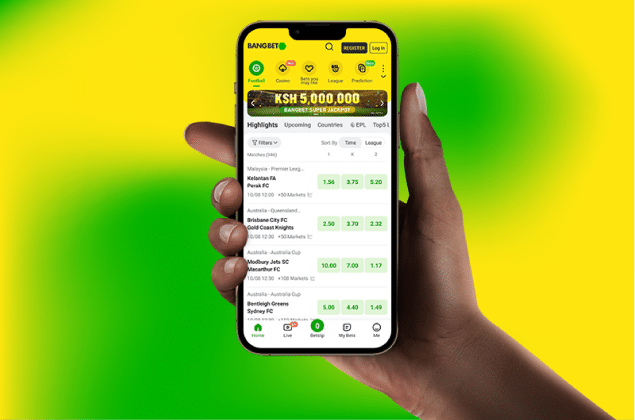Sports betting has been a popular form of gambling for decades. With the advent of technology, it has become more accessible and convenient. There are now many online betting platforms that allow people to place bets on various sports events. One popular betting platform is BangBet, which offers a seamless and enjoyable betting experience to users. In this article, we’ll show you how to download BangBet app for free and join the world of sports betting.
What is BangBet?
BangBet is a betting platform that allows users to bet on various sports events such as football, basketball, rugby, tennis, and more. It is an online bookmaker that operates legally and is licensed by the Nigerian government. BangBet offers competitive odds, a wide range of markets, and great bonuses and promotions to its users.
How to Download and Install BangBet App
Downloading and installing the BangBet app is easy and straightforward. The app is available for Android and iOS devices. Here are the steps to download and install the app:
For Android devices:
1. Go to BangBet’s website and click on “Download for Android”.
2. Allow the download to complete.
3. Once downloaded, locate the APK file in your downloads folder and tap on it to install.
4. Allow your device to install apps from unknown sources (Settings > Security > Unknown sources).
5. Once installed, open the app and follow the prompts to create an account.
For iOS devices:
BangBet is a leading online sports betting platform that allows you to bet on your favorite sports events. The user-friendly BangBet app is available for iOS devices, making it easier to place bets and manage your account on-the-go. Here’s how you can download and install the BangBet app on your iOS device.
Step 1: Visit the App Store
The first thing you need to do is open the App Store on your iOS device. You can do this by tapping on the App Store icon on your home screen. Make sure that you have a stable internet connection.
Step 2: Search for “BangBet”
Once you are in the App Store, tap on the search icon located at the bottom of the screen. Type “BangBet” into the search bar and press the search button.
Step 3: Download and Install the App
When you find the BangBet app in the search result, tap on the App icon, and it will take you to the app page. From here, tap on the “download” button, and the app will begin to download. When it’s finished downloading, tap on “open” to start the installation process.
Step 4: Allow the App for Your Device
If your device has advanced security settings, it may prompt you to allow the app to be installed. If this happens, go to the settings and navigate to the general settings. Scroll down and find the “Device Management” section. Here, you can allow the BangBet app for your device.
Step 5: Log In or Sign Up
After the installation is complete, you can open the app and log in to your existing account or sign up for a new account if you don’t have one yet. Once you have logged in, you can start exploring the app’s features and placing your desired bets on your favorite sports events.
How to Register on BangBet App
Creating an account on BangBet app is easy and takes a few minutes. Here are the steps to follow:
1. Open the BangBet app.
2. Click on “Register”.
3. Fill in your details including your name, email address, phone number, date of birth, and password.
4. Click on “Create Account”.
5. Verify your account using the code sent to your phone number.
6. Deposit money into your account using one of the available payment methods.
7. Start betting!
Benefits of Using BangBet App
There are many benefits to using the BangBet app. These include:
1. Convenience – you can access the app from anywhere and at any time.
2. Security – BangBet app is secure and your personal information is protected.
3. Range of sports events – BangBet offers a wide range of sports events to bet on, including local and international events.
4. Competitive odds – BangBet offers some of the best odds in the market.
5. Bonuses and promotions – BangBet offers great bonuses and promotions to its users to increase their winnings.
Conclusion
Sports betting is a fun and exciting way to enjoy your favorite sports events while also having a chance to win money. BangBet is a reputable betting platform that offers a seamless and enjoyable experience to its users. By following the steps outlined in this article, you can download BangBet app for free and start betting on your favorite sports events right away. Remember to gamble responsibly and only bet what you can afford to lose.








